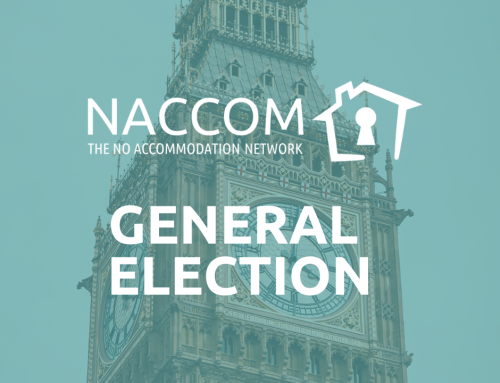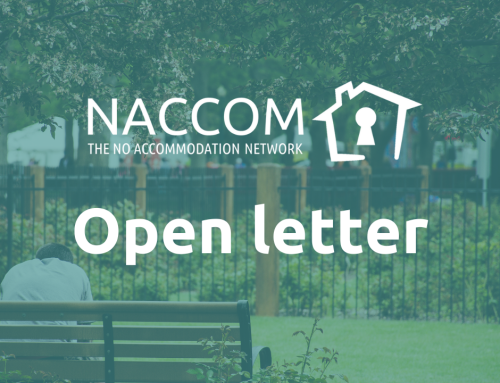This month we caught up with the team at Housing Justice, a NACCOM member based in London that run a hosting scheme and night shelter network. Housing Justice have recently received a large pot of funding from the Greater London Authority to reduce rough sleeping in the capital. We asked Jacob Quagliozzi, Director of Housing Justice England, about their plans and hopes for the funding.
‘We’ve got £250,000 to spend between now and April 2019 from the Greater London Authority (GLA) with a dual focus on extending bed spaces and supporting ‘move on’. The way we are spending it is by giving away grants to projects that are doing relevant work in the London area.
The first part of the funding, extending bed spaces, is crucial. Of those rough sleeping in London, around half are non-UK Nationals and a significant proportion of these are migrants with NRPF.
The difficulties and concerns some migrants without recourse have in accessing conventional or commissioned services mean that a significant proportion of people in night shelters in London are NRPF migrants.
The grant programme has been going well so far, we’ve funded well over 100 additional bed spaces in the first three months. The expectation is we will have significantly increased bed spaces by the new year, which is when we tend to expect the worst of the year’s cold weather.
As well as increasing bed spaces we are also working to improve move on from night shelter projects. For this, we are really looking for hosting schemes and/or night shelter projects that are piloting new work alongside direct provision. This could for instance be legal advice or rent deposit schemes. Though, whilst rent deposits are an important starting point to get people into longer term tenancies, there remains a problem around rent sustainability. It’d be great to see some organisations stepping forward with innovative approaches to address this problem.
A further aim of the funding is to improve signposting particularly around immigration advice. We know the difficulties shelter projects have in signposting NRPF migrants to the right services. So we’re looking at funding some events and support to develop this.
We’ll also be doing an evaluation of our hosting project and evaluation of our night shelter projects.
What’s great is that, alongside the GLA funding, there is more money around generally for rough sleeping this year, and because of the way that funding is working, there may be more non-UK nationals that are supported than before.
It’s also worth bearing in mind that the Severe Weather Emergency Protocol (SWEP) exists to prevent fatalities on the street during cold periods. All local authorities should be better resourced this year to run effective SWEP plans to get people in, irrespective of whether the individual has recourse.
In general, what is positive is an absolute recognition across all services, commissioned and non-commissioned, that if you are serious about ending rough sleeping and ultimately homelessness all together in London – and I don’t doubt that commitment – you have to address the issue of migrant homelessness and in particular destitution relating to those without recourse to public funds. That’s an encouraging step forward, though I think we all realise we have a long, long way to go.’
The minimum amount of funding projects can apply for is £1000 and the maximum amount is £15,000.
Funding received must be spent during the winter of 2018/19. A full list of criteria and conditions, alongside the application form, is available via this link: https://www.housingjustice.org.uk/grants
Potential applicants are encouraged to have a conversation with a member of The Housing Justice London Catalyst Team by calling 0203 544 8094.




